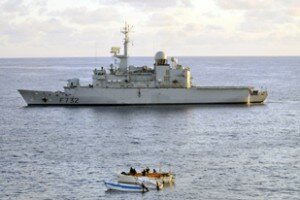
Bartamaha (Nairobi):- Somali pirates have hijacked a chemical tanker that was travelling off the coast of Madagascar, the ship’s Norwegian owner Broevigtank says.
The Marshall Island-flagged UBT Ocean has 21 crew on board, according to the Norwegian News Agency.
Svenn Pedersen of Broevigtank said on Friday: “The captain of the ship called us early this morning and told us: We have pirates on board. Very quickly afterwards we lost all contact with the boat.”
Edward Ion, a spokesman from Nautictank, the ship’s operator, said: “We are doing everything we can to establish contact and our sole concern right now is the safety of our crew. We have no contact whatsoever with the vessel, or the master, or the pirates.”
The UBT Ocean was travelling from Fujairah in the United Arab Emirates to the Tanzanian port city of Dar es Salaam, it said.
The vessel had taken a route well south of the zone where pirates operate, Pedersen said.
Vow to fight
International military officials have vowed to fight Somali pirates who have moved into the waters off the coast of East Africa, as attacks begin to intensify with the end of the monsoon season.
Nearly half the 47 ships hijacked off Somalia last year were taken after monsoon season in March and April – the most dangerous months of the year for ships in the Gulf of Aden and Indian Ocean.
In the most serious skirmish on Friday, six pirates attacked a vessel before breaking off and chasing down a French fishing boat, John Harbour, a spokesman for the EU naval force (Navfor), said.
A French military detachment onboard a nearby ship fired warning shots at the pirates before colliding with their boat and sinking it. Four pirates were rescued, but two others were missing, Harbour said.
“We know the monsoon is over. We know they’re coming. We’re taking the fight to the pirates,” Harbour said.
In a second incident on Friday, NavFor intercepted pirates on three vessels that had attacked another French boat.
The naval force said it destroyed their mothership and one small boat, taking 11 pirates into custody.
In other incidents on Friday, two Spanish tuna fishing boats off the coast of Kenya were attacked by pirates, Spain’s ministry of defence said.
A spokesman said the boats had contacted Spanish navy forces in the area, which dispatched air support that assisted the boats’ private guards in repelling the attack.
Arms race
The clashes followed a firefight Thursday between pirates and private security contractors onboard a Spanish fishing vessel.
The pirates hit the ship with a rocket-propelled grenade and the guards returned fire.
No one was hurt, but the International Maritime Bureau has expressed fears that the increased use of armed contractors could spark an arms race between fishermen and pirates, who are firing at ships with increasing frequency.
“The EU Navfor agrees with that recommendation because we don’t want an escalation of firepower,” Harbour said.
“Also, there are lots of gas and oil tankers in the Gulf of Aden that wouldn’t benefit from grenades and bullets flying around.”
Millions paid
Somali pirates attacked ships 217 times in 2009, up from 111 attacks in 2008 according to the International Maritime Bureau.
Crews have been successfully repelling more attacks, making it harder for pirates to capture ships and earn multi-million-dollar ransoms.
But the pirates have responded more violently. The International Maritime Bureau says only seven ships were fired upon worldwide in 2004, whereas 114 ships were fired upon last year off the Somali coast alone.
Many ship owners are investing in physical defences like stringing razor wire and adding fire hoses that can hit attackers with streams of high-pressure water. Some ships are even having electric fence-style systems installed.
Last year, the average ransom was around $2 million, according to Roger Middleton, a piracy expert from the UK think tank, Chatham House.
This year, two ransoms of around $3 million and $7 million have been paid, he said.
————-
Source:- Al-Jazeera.



